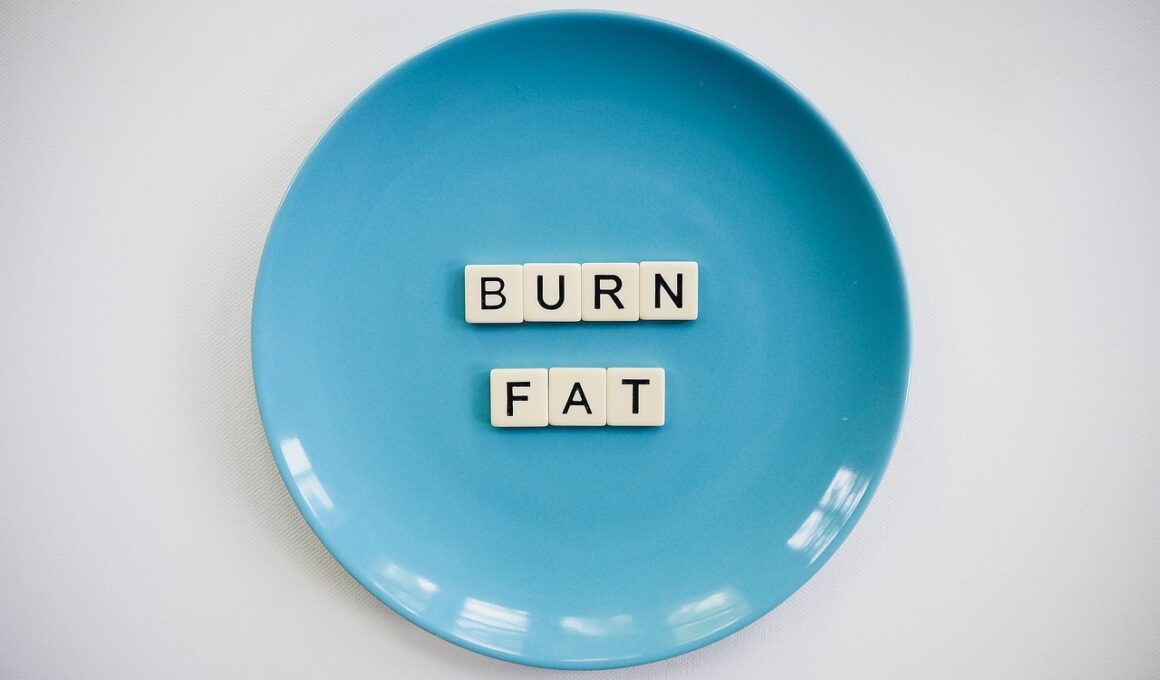Timing Your Fat Intake for Maximum Workout Benefits
When considering pre-workout nutrition, understanding the timing of fat consumption is essential. Dietary fats play a crucial role in energy supply during workouts but timing is key. Consuming fats too close to workout times can lead to digestive discomfort, as fats take longer to digest compared to carbohydrates. Generally, it is advisable to plan fat intake around two to three hours before the workout. This allows your body enough time to digest and metabolize fats efficiently. Components such as omega-3 fatty acids and unsaturated fats are excellent choices, as they contribute not only to sustained energy but also support overall health. Healthy fat sources include avocados, nuts, seeds, and olive oil, all of which can positively influence workout performance. Experimenting with fat intake in relation to your training sessions can help you find the optimal timing for your body. Additionally, it’s essential to maintain a well-rounded diet, ensuring an adequate balance of carbohydrates and proteins alongside fats. This balanced approach can aid in achieving your fitness goals effectively and efficiently. Proper fat consumption can lead to maximizing workout benefits and achieving desired results.
Research indicates that incorporating healthy fats into your pre-workout meals can enhance energy levels. Fats provide a concentrated source of energy, which is vital for endurance and prolonged workouts. When fats are consumed at the right time, they do not compromise digestion, thus avoiding uncomfortable workouts. Including fats too near your exercise schedule can lead to sluggishness and impact performance negatively. Foods rich in good fats should be eaten in moderation to ensure they support rather than hinder your workout intentions. Foods like nut butter or Greek yogurt with added seeds can be beneficial for the prerun nutrition window. Combined with carbohydrates, these foods can stabilize energy levels throughout your workout. Keep in mind your individual digestion needs; some may require longer or shorter post-intake timeframes based on their metabolism. Thus, pre-workout meals should be customized to your workout schedule and body needs. Consideration of your workout intensity is equally important; higher intensity workouts may require different approaches than lower intensity sessions. Maintaining variety in your fat sources can help provide diverse benefits and ensure you receive essential nutrients.
Choosing the Right Fats
The types of fats you consume leading up to workouts matter immensely. Focus on unsaturated fats, as they are heart-healthy and digest more readily than saturated ones. Sources such as fish, nuts, seeds, and avocado can boost your energy sustainably. MCT oils, derived primarily from coconut oil, are another excellent option, providing quick energy and enhancing endurance. Additionally, incorporating antioxidants from foods like omega-rich fish can reduce exercise-related inflammation, promoting faster recovery. Planning your meals, including fats, in advance will aid in sticking to your nutritional goals. Each food may react differently with your body, so monitoring your performance based on the fats consumed will lead to better workout results. Aim to consume about 15-20 grams of healthy fats within your pre-exercise plan, but again, time this intake for optimal digestion. As a general rule, consider limiting saturated and trans fats as they can lead to negative health effects and hinder performance. Ensure your fat intake coincides with the hydration aspects of your pre-workout meal plan to maximize overall workout power. Appropriate planning will provide a sustainable energy release during your workouts.
Balancing fat consumption with carbohydrate intake is vital for workout results. Carbohydrates serve as the primary source of energy for physical activity, while fats function as a more efficient energy reserve. Combining these macronutrients allows your body to utilize the energy more effectively. Additionally, carbohydrates facilitate the transport of fats into the muscle cells, making them vital for energy production during workouts. Therefore, a well-structured pre-workout meal should include both fats and carbohydrates while moderating protein content. For instance, a meal comprising oatmeal topped with almond butter offers both carbohydrate and unsaturated fat sources necessary for energy. Timing this meal approximately two to three hours before exercising will improve workout efficacy. Emphasizing the importance of meal structure can’t be understated; it’s better to approach nutrition from a balanced angle. Monitor how different combinations impact your performance and adjust as necessary. Understanding your body’s unique energy patterns is crucial for maximizing workout output. By applying trial and error, you can develop nutritional strategies using fats and carbohydrates to fuel effective workouts and improve endurance.
Effects of Fat on Endurance
The role of fats in endurance-based workouts cannot be overlooked. As endurance performance relies on sustained energy levels over long durations, fats are indispensable. During prolonged physical exertion, the body transitions towards burning fat for energy once glycogen stores are depleted. This is where the metabolic adaptations that come from regular fat consumption play a significant role. Training adaptations to fat metabolism allow the body to utilize fats more efficiently, improving performance. However, this process takes time and consistent training alongside adequate fat intake from your diet. As you implement fat into your pre-workout routine, pay attention to how your body adapts during your endurance sessions. Over time, you will notice improved stamina and reduced fatigue during exercise. It’s important to remember that not all fats are equally beneficial for performance; focusing on sources that promote better recovery and anti-inflammatory effects will yield better results. A well-rounded diet can assist in mastering fat intake while optimizing overall performance. Ultimately, endurance workouts will significantly improve when fat intake is timed and balanced accurately.
A common misconception is that all fats will hinder workout goals, but healthy fats can enhance athletic performance. Research has shown that balanced dietary fat intake supports hormonal balance, necessary for optimal muscle recovery. The role of hormones such as testosterone and cortisol is critical in maintaining muscle mass and recovery. Healthy fats promote the proper functioning of these hormones, which may lead to improved workout outcomes. Integrating specific fats, such as fish oil, directly supports metabolic health and muscle growth. Moreover, fat-soluble vitamins (A, D, E, K) that assist in recovery can also be found in fatty foods. These vitamins require dietary fat for absorption, highlighting their importance as well. Hence, timing your fat intake pre-workout not only provides energy but also ensures that you’re reaping the benefits associated with these vitamins. Monitoring how you feel post-exercise can guide you in adjusting fat intake levels further. Ultimately, focusing on quality sources rather than total fat calories will lead to better health outcomes and workout motivations. Be mindful of how fats, when timed correctly, can power your workouts and enhance your fitness journey.
Conclusion: Maximizing Your Workout
To maximize workout results, understanding how to time your fat intake is crucial. Pre-workout nutrition must be balanced, ensuring that you get sufficient energy without causing digestive discomfort. Monitoring the types and timing of fats can greatly influence your performance and recovery. Each athlete’s needs are unique, making it beneficial to personalize your approach based on your workout intensity and duration. Tracking your meals and workouts can provide insight into how your body responds to different fat and carbohydrate combinations. Ultimately, achieving maximum benefits involves thoughtful integration of fats into your nutrition plan. Aim for trial and error to discover what works best for you, while also allowing room for adjustments as necessary. Consult nutritional guides or professionals to aid in this journey for maximized benefits. Proper timing combined with quality and the right balance can lead to enhanced workout efficiency, resulting in improved fitness levels. Ultimately, embrace a holistic approach to pre-workout nutrition focusing on various macronutrients successfully. Finding this balance is key to making strides on your fitness journey.
In closing, being intentional about fat timing before workouts can lead to significant improvements. By focusing on how fats contribute to overall energy levels and workout adaptations, you open yourself to better results. Fats are vital for endurance and performance when consumed thoughtfully and in the right context. Create a pre-workout nutrition plan that incorporates quality fat sources and pairs them well with carbohydrates for maximum gain. Remember that hydration also plays a key role in workout efficiency. Implement these strategies in your regimen and witness the changes in performance and energy levels. Prioritize listening to your body and adapting your intake based on your results. Finding the optimal timing for your fat intake is a worthwhile endeavor, as it can help you achieve your fitness goals effectively and sustainably.


